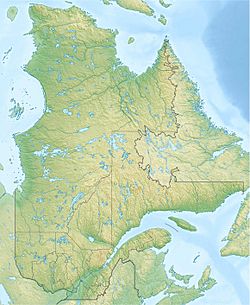Hugh Lake facts for kids
Quick facts for kids Hugh Lake |
|
|---|---|
| Location | Lac-Croche (TNO), La Jacques-Cartier Regional County Municipality, Capitale-Nationale |
| Coordinates | 47°42′32″N 71°55′47″W / 47.70889°N 71.92972°W |
| Lake type | Natural |
| Primary inflows | (clockwise from the mouth) La décharge du lac Lavoie, rivière Métabetchouane, la décharge des lacs Rocand, Apollon et Esculape, la décharge du second lac Demuth et Demuth, la décharge du lac de la Douve. |
| Primary outflows | Métabetchouane River |
| Basin countries | Canada |
| Max. length | 7.0 km (4.3 mi) |
| Max. width | 1.15 km (0.71 mi) |
| Surface elevation | 413 m (1,355 ft) |
Hugh Lake is a beautiful freshwater lake in Quebec, Canada. It is located in a special area called the Laurentides Wildlife Reserve. The Métabetchouane River flows right through it.
This lake is found in a place called Lac-Croche, which is an unorganized territory. It's part of the La Jacques-Cartier Regional County Municipality in the Capitale-Nationale region.
You can get to Hugh Lake using Quebec Route 155, which connects La Tuque and Chambord. There are also forest roads like R0410 nearby. These roads help people visit for fun or for forestry work.
Forestry, which is about managing forests and trees, is the main activity here. Tourism, like fishing or hiking, is also very popular.
Hugh Lake usually freezes over from early December until late March. It's generally safe to walk or play on the ice from mid-December to mid-March.
Contents
About Hugh Lake's Location
Hugh Lake is surrounded by many rivers and other lakes. Knowing about these helps us understand how water flows in the area.
Here are some of the main water areas close to Hugh Lake:
- To the north: Canuck stream and the Métabetchouane River.
- To the east: Petit lac Métascouac and the Métascouac River.
- To the south: The Métabetchouane River and the Rivière de la Place.
- To the west: Ventadour Lake.
Size and Shape of Hugh Lake
Hugh Lake is about 5.1 kilometres (3.2 mi) long and 0.9 kilometres (0.56 mi) wide. It sits at an elevation of 424 metres (1,391 ft) above sea level.
Many smaller lakes and streams feed water into Hugh Lake. These include Lake Lavoie, Lakes Rocand, Apollon, Esculape, and Lake Douve. The Métabetchouane River also flows into and out of the lake.
The lake has a unique shape. In the middle, it gets narrower because a piece of land, like a small finger, sticks out from the south shore. This peninsula stretches about 0.5 kilometres (0.31 mi) towards the northwest. The Métabetchouane River flows through the entire length of Hugh Lake, heading northwest.
Where the Water Goes
The water from Hugh Lake flows out from its northwest end. From there, the current travels a long way:
- First, the water flows through the Métabetchouane River for about 116 kilometres (72 mi) towards the northwest.
- Then, it reaches lac Saint-Jean, a large lake, and travels about 22.25 kilometres (13.83 mi) northeast.
- After that, the water enters the Saguenay River and flows for about 172.3 kilometres (107.1 mi) east.
- Finally, the water from Hugh Lake joins the Saint Lawrence Estuary at Tadoussac, which then leads to the Atlantic Ocean.
The Name of Hugh Lake
The name "Lake Hugh" was officially recognized on December 5, 1968. This was done by the Commission de toponymie du Québec, which is a group in Quebec responsible for naming places.
More Information
You can learn more about these topics:
- La Jacques-Cartier Regional County Municipality
- Lac-Croche, an unorganized territory
- Laurentides Wildlife Reserve
- Métabetchouane River
- Lac Saint-Jean
- Saguenay River
- St. Lawrence River
- List of lakes in Canada
 | Victor J. Glover |
 | Yvonne Cagle |
 | Jeanette Epps |
 | Bernard A. Harris Jr. |


